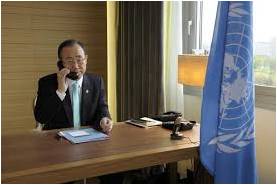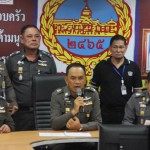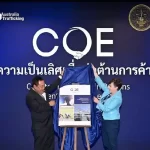
United Nations Secretary-General Ban Ki Moon threw his support last week behind Thailand’s effort to convene a regional meeting to find a solution to the exodus of Rohingya and Bangladeshi migrants from Myanmar and Bangladesh as several thousand migrants continue to languish on boats, many of them abandoned by their crews, on the Bay of Bengal.
The Secretary-General thanked Thailand for initiating the regional meeting during a telephone call on Sunday to Prime Minister Prayut Chan-o-cha. He urged Thailand to maintain human rights standards in dealing with the migrants. Prime Minister Prayut expressed deep concern over the Rohingya situation and assured Ban that Thailand would adhere to humanitarian principles, as well as Thai laws, in coping with the crisis. The following day, Deputy Prime Minister Prawit Wongsuwan announced that Thailand would establish a transit area where boat people could receive humanitarian assistance before journeying on to their intended destination.
“Everything will be based on international principles because Rohingya are human beings”, Deputy Prime Minister Prawit said.
The meeting on migrants is scheduled for May 29 in Bangkok, and 15 countries including the United States, and several international organizations, have agreed to send senior officials.
Thailand’s government also agreed to send its Minister of Foreign Affairs to Kuala Lumpur on Wednesday of this week to meet with his Malaysian and Indonesian counterparts to directly discuss and coordinate ways of handling the boat people situation ahead of the 15-country meeting.
As many as 8,000 migrants on a slew of boats have been trying to enter Malaysia and Indonesia, with some craft drifting into Thai waters. The Royal Thai Navy has been airlifting food and water to the vessels that enter Thai territory. Navy officers approached one ship abandoned by its crew and carrying about 700 migrants in need of food and water, as documented by international news agencies. When the Navy offered to allow them to land in Thailand, the migrants refused, saying they were trying to reach another country. The Navy provided them with food and water before allowing them to travel on.
“The Thais agreed to allow them to disembark, they said no,” said Jeff Labovitz, Bangkok-based spokesman for the International Organization Migration (IOM), a U.N. agency that is monitoring the crisis on Southeast Asian waters.
“That's really important – the Thais did the right thing here.”
Since the early 2000s, large numbers of migrants, many of them Rohingya, have been fleeing Myanmar and Bangladesh, with most hoping to make it to Malaysia or Indonesia. Many pass through Thailand, and many have fallen into the hands of transnational human trafficking gangs in Thailand and other countries.
The U.N. has described the Rohingya as one of the world’s most persecuted minorities. However, not all the migrants are Rohingya from Myanmar. Some are Rohingya from Bangladesh and others are Bangladeshis fleeing poverty and seeking work in other countries.
For more information and updates about Thailand's policies and actions against trafficking in persons and related issues, visit www.thaianti-humantraffickingaction.org




